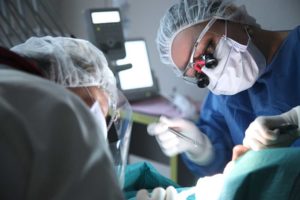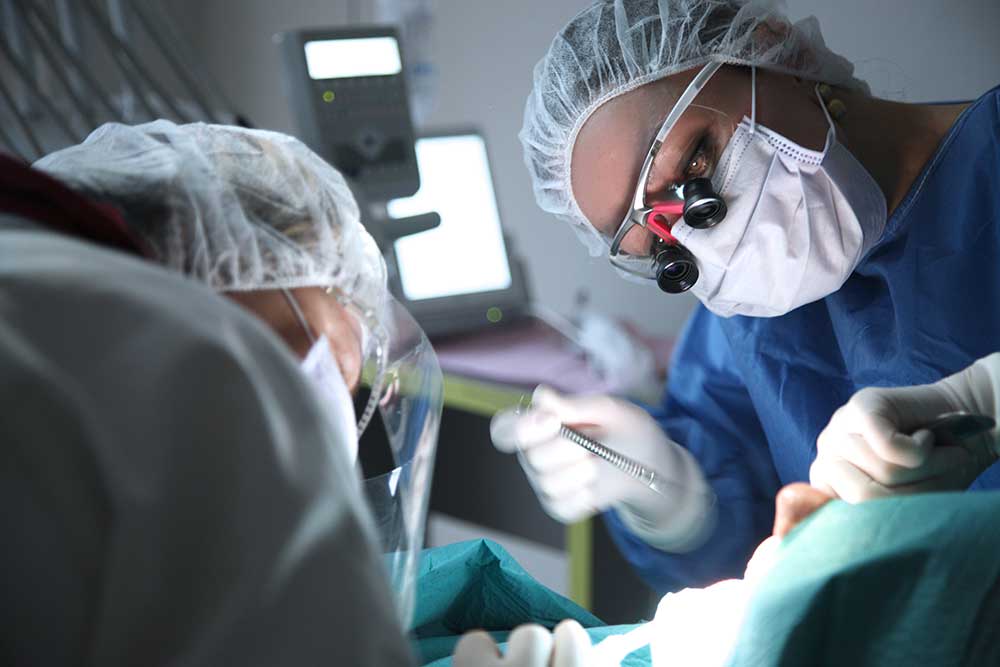Disclaimer: The information on our website is provided for general information purposes only. We make no representations or warranties of any kind, express or implied, about the completeness, accuracy, reliability, suitability or availability with respect to the website or the information contained on our website for any purpose. Any reliance on such information is therefore strictly at your own risk and we are not liable for any damages or losses arising out of or resulting from your reliance on any information contained on our website.
An oral surgeon performs surgeries, treatments, and provides diagnosis to patients with oral or facial issues. Additionally, they also work with other medical professionals to determine the right procedures and if surgery is needed. Next, watch a video to learn what an oral surgeon does.
How to Become an Oral Surgeon
To become an oral surgeon you must be knowledgeable in dentistry, surgery, and trained as a medical practitioner. You must earn both a dentistry and medical degree; most complete a medical degree prior to pursuing their dentistry degree. In addition to the degrees needed, you can attend a specialty fellowship that focuses on oral and maxillofacial surgery areas such as cancer, cosmetic, craniofacial, or reconstruction surgery.
Job Description of an Oral Surgeon

Oral and maxillofacial surgeons perform operations and procedures on the tissues of the mouth and maxillofacial region of the head to treat diseases, injuries, or defects. They diagnose and may perform surgery to improve function or appearance for their patients.
They fix birth defects and trauma to the mouth or oral cavity. This can include reconstruction and well as the removal of tissues that should not be there. They often times are able to administer anesthesia to their patients in preparation for surgeries which not all surgeons can do; therefore have extensive education in this. It can also be something as simple as the position of wisdom teeth, dental implants, or remove impacted and non-restorable teeth.
An oral surgeon works extended and irregular hours. They may work in a medical office and then do their surgeries at hospitals or outpatient care centers or have a one-stop-shop where they can do both consultations and surgeries. According to the Bureau of Labor Statistics, the highest rate of employment for this profession is within dentist offices, physician offices, medical and surgical hospitals, and outpatient care centers.
Career Video Transcript
Oral and maxillofacial surgeons perform intricate surgeries on jaws, teeth, lips, and the surrounding structures. They may diagnose a patient’s misaligned jaws, obstructive sleep apnea, or cancers of the mouth. They perform surgery that removes tumors or impacted teeth, adjust the position of the jaw to be more functional and comfortable, or provide structure and symmetry to the appearance of the face and mouth.
Some provide emergency treatment of facial injuries, or may reconstruct a patient’s jaws and face after an illness. They may also administer conscious sedation for patients who need it, when full anesthesia is not indicated. These surgeons may work in hospitals for more complicated operations, but usually spend most of their time in a dental office with an outpatient surgery suite. They collaborate with other professionals, like orthodontists and restorative dentists to plan treatment for diseases, injuries, and defects of the mouth. They typically work full-time.
Becoming an oral and maxillofacial surgeon requires a doctoral degree from dental school, dentistry licensure, and a four- to six-year surgical residency after which they must obtain board certification. Many also obtain a medical doctor degree as well. The extensive training and experience these surgeons bring to their work enables them to solve complex problems and relieve patients’ pain right when it’s needed the most.
Article Citations
Bureau of Labor Statistics, U.S. Department of Labor Occupational Employment and Wages, May 2016, Oral and Maxillofacial Surgeons.
Bureau of Labor Statistics, U.S. Department of Labor, Occupational Outlook Handbook, Physicians and Surgeons.
National Center for O*NET Development. 29-1022.00. O*NET OnLine.
The career video is in the public domain from the U. S. Department of Labor, Employment and Training Administration.

